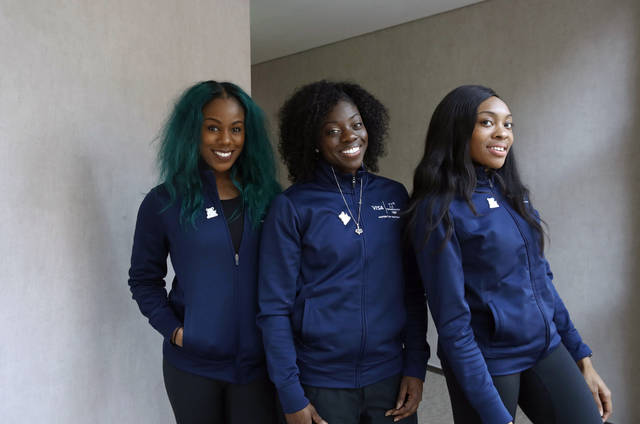PYEONGCHANG, South Korea — Growing up in St. Paul, Minnesota, Akuoma Omeoga was raised on Nigerian food, language and culture. Next week, the 25-year-old will represent her parents’ homeland in the Winter Games, hurtling down the bobsled track with her tresses — dyed green as a tribute to the country — flapping beneath her helmet like a flag.
“One of the biggest things my parents did was speak the language at home,” Omeoga recalled in an interview with The Associated Press on Tuesday. “It’s super familiar to me, even though it’s not something that I speak fluently … I can also relate.”
Omeoga and fellow brakeman Ngozi Owumere, along with driver Seun Adigun, are all Americans of Nigerian descent who will represent the African nation in its Winter Olympics debut. The country is one of eight African nations competing in South Korea as part of the largest contingent of African athletes ever at a Winter Games.
For Adigun, her roots are as important as her birthplace, which is what pushed her to create Nigeria’s first-ever bobsled team. To be a first-generation Nigerian is to have the patriotism of your homeland “almost pounded into you” by parents who don’t want you to forget where you come from, explains Adigun, who also competed as a track athlete for Nigeria in the 2012 London Games.
“Although we’re American, we’re also Nigerian,” she said.” We’re actually Nigerian first. That’s the one culture that we know, that we were raised to respect and understand. To show people that it’s okay to be both and it’s okay to represent where you’re from is a powerful message that, hopefully, we’ve been able to translate.”
Owumere said the preservation of her African culture was especially important being raised in America. The team’s Olympic journey has only reinforced the importance of that heritage, she said, and of leaving a legacy in Nigeria’s name.
“After our parents are gone, who’s going to be there?” she said. “The weight rests on us. We’re the new generation of Nigerians.”
It’s a point that took on added meaning after President Donald Trump’s reported comments earlier this year referencing some African nations as “shithole countries.” Omeoga said she hopes the team’s presence in South Korea this month offers a new image of who and what African immigrants can be and contribute.
The women are unapologetically Nigerian on social media, at public appearances and on the competition circuit, where they blast Nigerian music before races. At last week’s opening ceremony, they entered the Olympic Stadium wearing green and white aso-oke, a Yoruba cloth worn on special occasions.
The team has also been eager to connect with fellow African athletes from such countries as Madagascar and Eritrea — also making its debut this year— and is close to Ghanaian skeleton athlete Akwasi Frimpong.
It is an important statement for the continent to be represented in the Winter Olympics, Adigun said.
“Just because you don’t know what it means to see snow or to understand temperatures that are equivalent to ice, that doesn’t mean you have to shy away from it,” she said. “That’s what Africa is representing — that we can take those risks and still be able to compete with the best in the world.”
Not that it’s not cold, Onwumere concedes, laughing. The Texan in her is shivering, but the Olympian is ready.
“Honey, it’s super cold!” she said. “But we’re here for the Winter Olympics. This is what we expected. We welcome it. We want it to be a little warmer, but we’re fine with how it is.”
Omeoga’s attitude for those who would suggest that Nigeria doesn’t belong is, “Why not?”
“There’s nobody on this Earth that can tell you that you don’t belong somewhere that you are,” she said. “That’s the biggest thing that we bring to this Games. You shouldn’t be asking why (we are here); you should be asking how.”
———
Errin Haines Whack is The Associated Press’ national writer on race and ethnicity. Follow her on Twitter at emarvelous.


